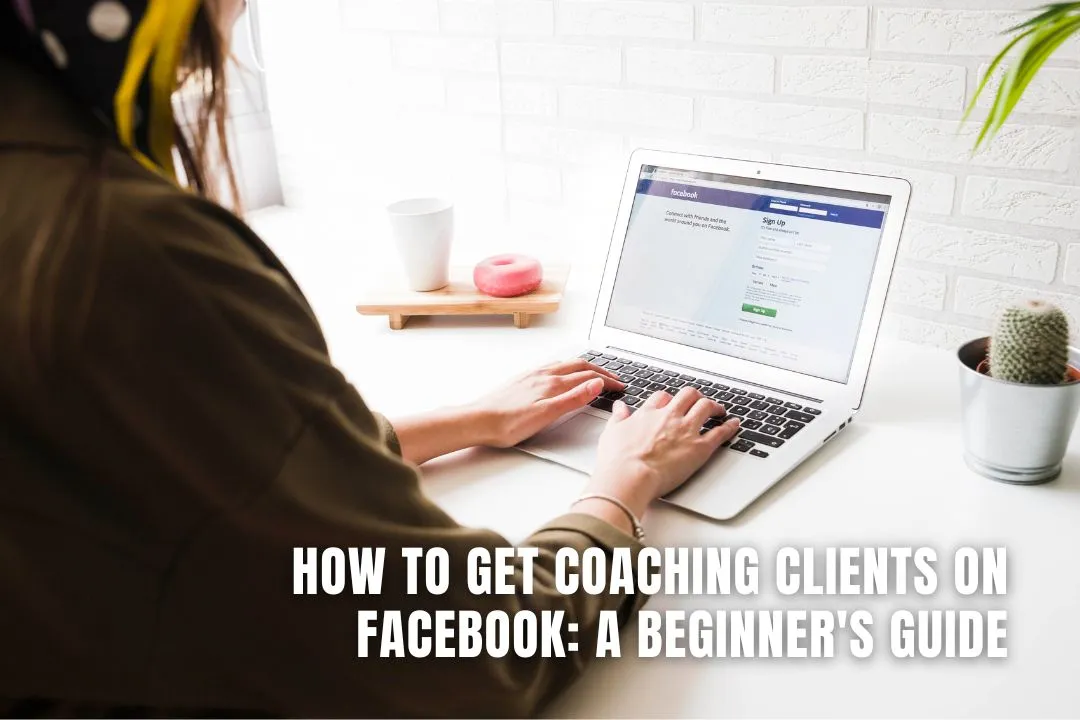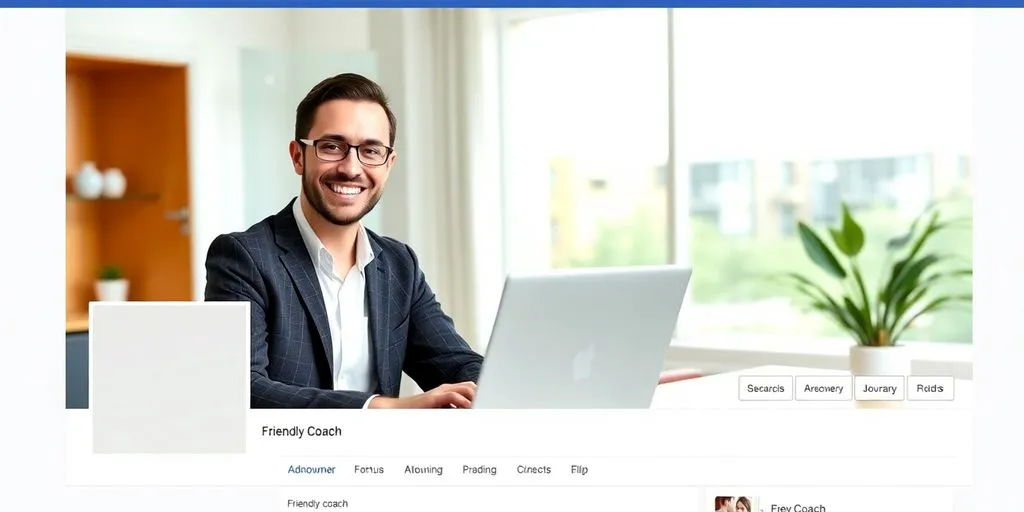
Jumping into the world of Facebook to get coaching clients can feel like a wild ride. Facebook isn't just for sharing holiday snaps or memes about cats; it's a massive platform where you can seriously grow your coaching business. Whether you're a newbie or have been around the block a few times, understanding how to use Facebook effectively can make a big difference. From setting up your profile to running ads, there's a lot to learn. Let's break it down and see how you can make Facebook work for you.
Looking to pick up coaching clients at lightning speed? The landscape might keep evolving, but some tried-and-true methods remain key, even as we rocket into 2025.
Start by putting yourself out there in person. Nothing beats connecting face-to-face, whether it's through speaking at events, workshops, or simply networking at industry meetups. Referrals from happy past clients can work wonders, sometimes all it takes is a glowing recommendation to open the door to your next big opportunity.
But don’t stop there. Think about where your people are already hanging out online. Dive into Facebook groups dedicated to your niche, join conversations on Reddit, share insights on YouTube, and hop onto podcasts as a guest expert. Consistency is key: showing up, sharing your knowledge, and offering real value helps build your reputation as someone worth listening to.
Here’s what to focus on:
By mixing good old-fashioned relationship-building with strategic online visibility, you’ll be well on your way to a steady stream of coaching clients, no matter what changes the future brings.
Sometimes, you just need to get scrappy and stick to the basics, the tried-and-true methods coaches have relied on long before Facebook came along. If you’re looking to find clients fast (without spending a penny), these classic tactics can get you moving:
These low-tech tactics might feel a little old-school, but when you need clients fast, nothing beats rolling up your sleeves and making personal connections.

Facebook is a massive platform, with billions of users logging in every month. It's not just young people; you’ll find a broad range of ages and interests. This makes it a goldmine for coaches looking to reach a diverse audience. Understanding these demographics can help you tailor your approach, ensuring your message hits the right people. Consider these points:
For coaches, Facebook offers a unique opportunity to build a business. It's not just about posting content; it's about creating a community. The platform allows for direct interaction with potential clients, making it easier to establish trust and rapport. Here’s why it stands out:
Building strong relationships is crucial in coaching, and Facebook is a fantastic tool for this. Through regular posts and interactions, you can maintain a presence in your clients' lives even outside of sessions. Here's how you can use Facebook to strengthen these bonds:
"Facebook isn't just a social media platform; it's a community builder. By engaging authentically, you can transform casual followers into dedicated clients."
For more strategies on targeting specific audiences, discover effective strategies for targeting students with Facebook Ads.

Your Facebook profile is like a digital handshake. First impressions matter! Make sure your profile picture is clear and professional, ideally a headshot where you're looking approachable. Your cover photo should reflect your coaching brand—maybe an inspiring quote or an image that resonates with your coaching style.
Think of your profile as your online business card. It's the first thing potential clients see, so make it count.
Facebook offers a slew of features that can boost your visibility. Start by making your profile public so people can find you easily. Use the 'About' section to detail your coaching services and experiences. Don’t forget to include contact info so potential clients can reach you.
To showcase your expertise, regularly post content that demonstrates your knowledge. Share tips, client testimonials, and success stories. Facebook Live is a great tool to engage with your audience in real-time, offering mini-coaching sessions or Q&A.
Incorporating these strategies can significantly enhance your coaching business on Facebook, making it easier to attract and retain clients.
Creating a Facebook group dedicated to your coaching practise can be a game-changer. Groups offer a unique space where you can connect with your audience on a more personal level. Unlike pages, groups allow for more interaction and engagement among members. Here, you can foster a sense of belonging and community, which can be particularly valuable for coaches. Members of your group can share their experiences, ask questions, and support each other, creating a vibrant community. Plus, you'll have the opportunity to showcase your coaching skills and knowledge in a more informal setting.
Engagement is key to the success of any Facebook group. Regular interaction with your members will keep the group lively and interesting. Here are some tips to engage effectively:
Remember, the goal is to create a space where members feel heard and valued.
Growing your group doesn't happen overnight, but with consistent effort, it's definitely achievable. Start by inviting your existing clients and encouraging them to invite others who might benefit from your coaching. Use your personal and business networks to spread the word. Additionally, focus on creating and curating actionable content that resonates with your target audience. This not only attracts new members but also keeps current members engaged. Lastly, be patient and persistent; organic growth is about building genuine relationships over time.
Building a community takes time and effort, but the rewards are worth it. When people feel connected and valued, they are more likely to become loyal clients and advocates for your coaching practise.
Running or participating in Meetup groups can be a fantastic way to connect with potential clients and showcase your expertise. Organising gatherings around specific coaching topics, like leadership development, career transitions, or wellness, positions you as an authority in your niche. These local or virtual events allow you to interact directly with attendees, answer questions, and offer valuable insights in an informal setting.
Not only do these interactions foster community, but they also naturally generate leads as attendees refer friends or express interest in your coaching services. Over time, a well-run Meetup can become a consistent source of new clients for your business.
When you're trying to reach potential clients, Facebook Ads can be a game-changer. Facebook's targeting tools let you zero in on your ideal audience. You can choose who sees your ads based on age, location, interests, and even their online behaviour. This means you’re not just throwing your ad out there and hoping for the best. Instead, you're putting it right in front of the people most likely to be interested in your coaching services.
Imagine you’re a life coach specialising in career transitions. With Facebook's targeting, you can aim your ads at people who’ve shown interest in career development, job hunting, or personal growth. This way, your ad budget is spent wisely, reaching those who are more likely to become paying clients.
Creating a successful ad campaign on Facebook isn't just about writing a catchy headline. You need to think about the whole package. Start by discovering how to create compelling Facebook ads that capture attention and boost sales. Your visuals should be eye-catching, your text should speak directly to the needs and desires of your audience, and your call-to-action should be clear and inviting.
Here’s a quick checklist to get you started:
Once your ads are live, it’s time to keep an eye on how they’re doing. Facebook provides detailed analytics that show you how many people saw your ad, how many clicked on it, and what actions they took next. This data is crucial because it tells you what’s working and what’s not.
Keep track of key metrics like click-through rate (CTR), conversion rate, and return on investment (ROI). If you notice your ad isn’t performing as expected, don’t worry. You can tweak your targeting, change up your visuals, or refine your message to see if it makes a difference.
Monitoring and adjusting your ads is part of the process. It's all about finding the right mix that resonates with your audience and brings in the clients you’re looking for.
By understanding targeting, crafting engaging campaigns, and analysing results, you can use Facebook Ads to effectively grow your coaching business.
Creating content that speaks directly to your potential clients is key. Videos can be particularly engaging, offering a personal touch and allowing you to showcase your personality and expertise. Consider sharing success stories or client testimonials to build trust. Written posts, like insightful articles or quick tips, can also provide value and keep your audience informed.
If the thought of being on camera makes you anxious, you’re certainly not alone. Many coaches feel nervous about recording videos or going live, but remember, your potential clients aren’t looking for perfection. They want real advice from someone who understands their challenges.
Start small if you need to. Try recording short tips on your phone, or rehearse a couple of times before hitting “publish.” With platforms like YouTube (the world’s second-biggest search engine), you have a chance to reach an enormous audience searching for coaching support and self-development. Plus, as video content continues to gain priority on Google, investing some time in getting comfortable can really pay off for your visibility.
Here are some practical ideas to help you move past camera shyness and deliver value through video:
Over time, you’ll gain confidence, and your unique personality will shine through. What matters most is showing up and offering practical, actionable coaching insights that meet your clients where they are.
Podcasts are more than just background noise on your morning walk, they’re powerful networking and visibility tools for coaches. Whether you’re being interviewed as a guest or stepping into the host’s chair, podcasts help amplify your voice to audiences that might otherwise never hear about your work.
Here’s how getting involved with podcasts can move the needle for your coaching business:
By embracing both sides of the microphone, guest and host, you expand your reach, present yourself as an expert, and create stronger connections with those who most need your coaching.
YouTube is more than just a hub for entertainment, it’s a powerful platform for coaches to showcase expertise and connect with new audiences. As the world’s second-largest search engine (right behind Google), YouTube is often where people go to find advice on personal growth, career transitions, life coaching, and more.
By starting a YouTube channel, you position yourself in front of people actively searching for solutions that you provide. Sharing videos on coaching topics, practical tips, or client success stories not only highlights your personality and approach but also helps potential clients see the real person behind the business. Video content is engaging and can quickly build trust, viewers get a sense of your communication style, values, and what it might be like to work with you.
If stepping in front of the camera feels daunting, remember: most viewers are looking for genuine insights, not polished performances. Focus on sharing value, think “helpful advice over flawless delivery.” The more you share your knowledge and passion, the more likely you are to establish authority in your niche.
A few tips for coaches considering YouTube:
Regularly posting valuable video content not only increases your visibility on YouTube but can also improve your search ranking on Google, thanks to the close relationship between the two platforms. As you build a library of helpful videos, you’ll become a go-to resource for those looking for coaching services, helping you attract more of your ideal clients.
Consistency is vital when it comes to posting content. A regular posting schedule helps keep your audience engaged and expecting more. Use tools like scheduling apps to plan your posts in advance. This not only saves time but ensures you maintain a steady flow of content. Aim for a mix of content types to keep things fresh and exciting.
Stories and live videos are fantastic for creating a sense of immediacy and connection. They allow you to interact with your audience in real-time, answering questions and providing insights on the spot. Use stories to give a behind-the-scenes look at your coaching process or to share daily motivations. Live videos can be used for Q&A sessions, giving your audience a chance to get to know you better.
Engaging content is not just about selling your services; it's about building a community where your audience feels valued and understood.
Finding the right people to collaborate with on Facebook can be a game-changer for your coaching business. Start by identifying individuals or groups that share similar goals or audiences. Look for active members in industry-specific groups or those who frequently engage with your content. Building relationships with the right people can open up new opportunities and expand your reach. Use Facebook's search function and explore group memberships to discover potential collaborators.
Once you've identified potential collaborators, the next step is to establish a relationship that benefits both parties. Begin by engaging with their content, like, comment, and share their posts. Reach out with a friendly message expressing your interest in working together. Offer something of value in return, such as sharing their content with your audience or co-hosting a live session. The key is to ensure both sides gain from the partnership, creating a win-win scenario.
Collaborations can significantly boost your visibility on Facebook. By partnering with others, you tap into their audience, which can lead to increased followers and engagement for your page. Consider running joint events or webinars, where both parties can showcase their expertise. This not only broadens your audience but also strengthens your credibility. Keep in mind that successful partnerships often start with clear communication and shared objectives.
Collaborating on Facebook isn't just about increasing your numbers, it's about creating meaningful connections that can lead to long-term success. By working together, you and your partners can achieve more than you ever could alone.
For more insights on fostering group interactions, consider using questions effectively to stimulate conversations and enhance engagement. This strategy can be quite valuable for networking and building a strong online presence.
Reaching out to journalists or using digital PR platforms like SourceBottle can be transformative for coaches looking to elevate their profile. When you share compelling stories or expert insights with media professionals, you open the door to valuable press coverage, often at little or no cost. This kind of exposure positions you as an authority in your niche, helps you build credibility, and showcases your expertise to a wider audience.
But that’s not all. Media mentions and guest appearances can also enhance your visibility on search engines, as reputable sites often link back to your website or social media pages. This boost in SEO can drive more organic traffic and attract new leads who discover you through trusted publications.
Incorporating digital PR into your strategy can help solidify your reputation, attract potential clients, and set you apart from the competition, all while building relationships with key players in your industry.
Handling negative comments on Facebook can be tricky. First off, stay calm. It's easy to get defensive, but remember, your response is public. Take a moment to assess the situation. Is the comment constructive or just plain rude? If it's the latter, consider ignoring it or deleting it if it violates your community guidelines. For constructive criticism, respond politely and thank the person for their feedback. This shows you're open to improvement and value your clients' opinions.
Criticism can actually be a gift if you know how to use it. Look at negative feedback as a chance to learn and grow. Ask yourself, "Is there any truth to this? What can I do better?" Sometimes, a simple change can make a big difference. By addressing these points, you can improve your services and strengthen your client relationships. Embracing criticism can be a valuable tool for personal growth and learning.
Keeping a positive vibe on your Facebook page is crucial. Regularly post positive content and engage with your audience in a friendly manner. If you make a mistake, own up to it. Apologise sincerely and explain how you plan to fix it. Transparency builds trust and shows your clients that you're committed to providing the best service possible.
"Every setback is an opportunity to create your Bounce-Up™. Embrace the challenges, learn from them, and move forward with confidence."
So there you have it, folks. Getting coaching clients on Facebook isn't some mystical art. It's about being genuine, showing up consistently, and engaging with your audience. Remember, it's not just about numbers; it's about building real connections. Start small, test what works, and don't be afraid to tweak your approach. With time and patience, you'll find your groove. And who knows? Your next client might just be a message away. Keep at it, and happy coaching!
Begin by setting up a professional Facebook profile that highlights your expertise. Join and participate in groups related to your niche, and share valuable content regularly to engage potential clients.
Share a mix of content like helpful tips, client testimonials, live videos, and engaging stories. Make sure your content speaks directly to the needs and interests of your target audience.
Facebook ads allow you to target specific audiences based on their interests, location, and behaviour. This helps you reach potential clients who are most likely to be interested in your services.
Respond to negative comments calmly and professionally. Use criticism as an opportunity to improve your services and show your commitment to client satisfaction.
A Facebook group creates a community where you can engage directly with potential clients, share insights, and build trust. It also offers a platform for members to interact and support each other.
Yes, collaborating with other coaches or businesses can introduce you to new audiences and provide opportunities for cross-promotion, which can help grow your client base.